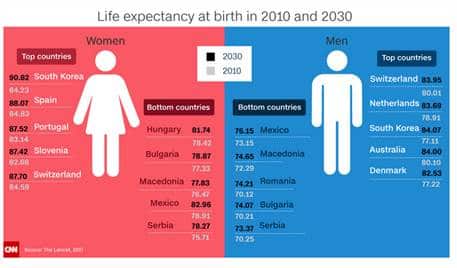In Europe French and Swiss women are being predicted to have the highest life expectancies with averages estimated to be 88.6 and 87.7 years respectively. Lowest projected life expectancy overall were for women in Macedonia and men in Serbia.
5 countries with the highest life expectancy at birth projected in 2030 for men are South Korea at 84.07, Australia at 84.0, Switzerland at 83.95, Canada at 83.9, and the Netherlands at 83.69; For women South Korea at 90.82, France at 88.6, Japan at 88.4, Spain at 88.07 and Switzerland at 87.70 years of age.
Predictions for high income countries have the USA continuing to lag with the lowest life expectancy at birth estimated to be an average of 83.3 years for women and 79.5 years for men, figures which are similar to Croatia and Mexico.
Countries with lower life expectancies have relatively high rates of young and middle aged mortality with people having relatively high risks of dying in their 40s and 50s. There are a range of reasons for death in this age range including greater obesity rate and obesity associated health risks, homicides, road accidents with and without alcohol, smoking, and lack of universal health care. A lot of this is driven by inequality, bringing down the national overall average.
Life expectancy was calculated using data on the age at which people die across a population, using an ensemble of 21 forecasting models, applying a probabilistic Bayesian model averaging approach to mortality and life expectancy projection. For example high childhood mortality rates of death among young people due to violence and injuries brings down an average. Greater equality, more comprehensive health care, healthy diets and lifestyles embedded in a culture can bring an average up, as is the case with South Korea.
Countries such as South Korea, Switzerland, Canada, and some emerging economies are doing well, with South Korea having remarkable success. It is believed that South Korea’s success can be attributed to the country’s investment into childhood nutrition, education, and technology along with low blood pressure, low levels of smokers, and good access to health care. Scandinavian countries also do well as they are counted as more equal and tend to have higher life expectancy outcomes projected.
Japan which has been long revered for longevity are only projected to see a small increase in life expectancy. Their longevity story is starting to come to an end, as the culture known for healthy diets and active lifestyles is beginning to change. While they still have relatively low obesity and blood pressure, Western influences are starting to catch up with their society. South Korea has caught up with Japan as its standard of living has increased. In many parts of Asia young people are eating Western diets, that healthy diet may not be sustained as youths reach older ages.
Researchers from the Imperial College London in collaboration with the World Health Organization hope that their findings will help countries learn healthy changes can have an impact, and to help policy makers prepare for their population’s changing demographics. What South Korea has done for the most part goes against some Western countries prosperity agenda, researchers note that worldwide countries need to think about social care, health care, and planning pensions for an aging population, adding projections are in line with what other projections are showing with countries in Asia leading but seeing changes among younger populations, with inequality being an underlying factor as to why some higher income countries have lower projected life expectancy.
*Note: Image accompanying this article credit: The Lancet/CNN




